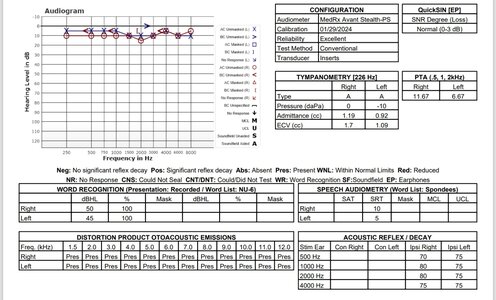Hello everyone!
After experiencing acoustic trauma from a concert over three months ago, I've been dealing with various symptoms. I wasn't sure exactly what to call it, but it might be a mild form of hyperacusis. Here are my current symptoms:
From what I understand, hyperacusis can cause certain sounds to become imbalanced or louder in general, even if there's no pain from everyday noises. Has anyone else experienced symptoms similar to mine? If so, did they improve over time?
Thankfully, my hearing test with an audiologist last week showed no measurable hearing loss. I'll share my results below for context. The QuickSIN test results (which assess speech-in-noise perception) also came out normal, though they aren't shown here.


After experiencing acoustic trauma from a concert over three months ago, I've been dealing with various symptoms. I wasn't sure exactly what to call it, but it might be a mild form of hyperacusis. Here are my current symptoms:
- Slight burning in my ears, sometimes triggered by constant background noise. In the first month, laughter near my ear would cause instant pain, but that's no longer the case.
- Difficulty hearing voices in the presence of background noise like running water, air conditioning, or appliance humming. Interestingly, I don't struggle as much when the background noise is crowd chatter. At first, I thought voices had become quieter, but it might actually be that other sounds have gotten louder. When I walk into grocery stores or restaurants, commercial refrigerators and drink dispensers definitely sound louder than normal. However, I don't have trouble hearing people in quiet environments.
- Issues distinguishing sounds of similar frequencies. For example, I used to hear my hands rubbing together with soap while running water from the sink, but now it's much harder to detect that sound when the water is on.
- Instrumentals in music overpowering vocals and making consonants sound muted. This issue is especially noticeable with high-frequency or "swishy"-sounding instruments like cymbals. It also seems more pronounced when listening through phone speakers compared to other audio sources. Here's an example of a song where I've noticed this issue:
- Bass in music sounding lower in volume than before.
From what I understand, hyperacusis can cause certain sounds to become imbalanced or louder in general, even if there's no pain from everyday noises. Has anyone else experienced symptoms similar to mine? If so, did they improve over time?
Thankfully, my hearing test with an audiologist last week showed no measurable hearing loss. I'll share my results below for context. The QuickSIN test results (which assess speech-in-noise perception) also came out normal, though they aren't shown here.

